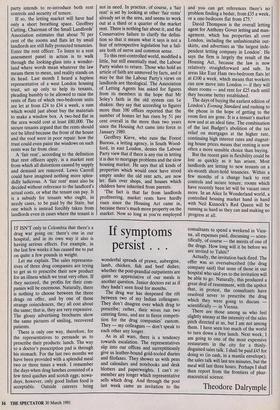NEITHER BORROWER NOR LENDER
Sandra Barwick is worried that
Labour could destroy the reviving rental market
I HAVE a friend who lives in a house owned by a family trust in Holland Park. Her grandfather met an old friend in his club one day who said his godson had just come to London and was desperate for a room. 'He's welcome to move in, but one of my grandchildren will be wanting to move in fairly soon, so I'm afraid it can only be temporary,' said my friend's grand- father. Five years later, despite many pleas, the godchild is still established on the ground floor. The market rent for a
one-bedroom flat in the area is around £170 a week. The godchild is a 35-year-old accountant in the City: he pays £20 a week `fair rent', and he can stay for the rest of his life.
I had a friend ten years ago who had inherited a house in the Midlands. She let it to students as bedsits. One of the students went to the rent officer and had the rent reduced. As a direct result, that summer my friend sold the house and invested the money instead.
I had a friend who was a resting actor, who tenanted a ground floor flat in south London for a very small 'fair rent'. He would have liked to move elsewhere, but he didn't because he knew he was not wanted. Eventually the landlord paid him £60,000 to leave.
Such stories are common, though not, apparently, believed in the Labour Party. It does not consider that the old Rent Acts, which held down rents and gave tenants security of tenure, discouraged people from letting.
Nor does it believe that the 1988 Hous- ing Act, which made it possible to let property for short periods at market rents and get the property back at the end, has meant that more homes are being let. It promises: 'Labour will ensure that rents are set at levels which people can afford.' Clive Soley, the shadow housing minister, has told landlords' associations that the party intends to re-introduce both rent controls and security of tenure. If so, the letting market will have had only a short breathing space. Geoffrey Cutting, Chairman of the Small Landlords' Association estimates that about 70 per cent of the rooms and flats let by small landlords are still fully protected tenancies. Enter the rent officer. To listen to a rent assessment panel in action is to walk through the looking-glass into a wonder- land where words mean whatever the law means them to mean, and reality stands on its head. Last month I heard a hapless representative of a west London housing trust, set up only to help its tenants, pleading humbly to be allowed to raise the rents of flats of which two-bedroom units are let at from £24 to £34 a week, a sum which would just about buy the materials to make a window box. A two-bed flat in the area would cost at least £80,000. The secure tenants argued that the rents should not be lifted because the front of the house and the roof were in poor repair: how the trust could even paint the windows on such rents was far from clear.
A 'fair rent', according to the definition that rent officers apply, is a market rent from which all distortions caused by supply and demand are removed. Lewis Carroll could have imagined nothing more splen- didly ludicrous. A 'fair rent' must also be decided without reference to the landlord's actual costs, or what the tenant can pay. It is a subsidy for tenants who ought, in needy cases, to be paid by the State, but one which is instead forcibly taken from landlords even in cases where the tenant is not in need. In practice, of course, a `fair rent' is set by looking at other 'fair rents' already set in the area, and seems to work out at a third or a quarter of the market rent. There is nothing fair about it, and the Conservative failure to clarify the defini- tion so that it means what it says is not a fear of retrospective legislation but a fail- ure both of nerve and common sense.
To this rent-controlled world, modified a little, but still essentially mad, the Labour Party wishes to return. Those who hold an article of faith are unmoved by facts, and it may be that the Labour Party's views on landlords are theological. The Association of Letting Agents has asked for figures from its members in the hope that Mr Soley's faith in the old system can be shaken: they say that according to figures more than 100 offices reported that the number of homes let has risen by 51 per cent overall in the more than two years since the Housing Act came into force in January 1989.
Geoffrey Kieve, who runs the Forest Bureau, a letting agency, in South Wood- ford, in east London, denies the Labour Party view that if there is any rise in letting it is due to mortgage problems and the slow housing market. He says that all kinds of properties which would once have stood empty under the old rent acts, are now let: flats over shops, and houses which children have inherited from parents.
`The fact is that far from landlords profiteering, market rents have hardly risen since the Housing Act came in, because there's much more property on the market. Now so long as you're employed and you can get references there's no problem finding a bedsit, from £35 a week, or a one-bedroom flat from £75.'
David Thompson is the overall letting agent for Anthony Gover letting and man- agement, which has properties all over London, including the unfashionable out- skirts, and advertises as 'the largest inde- pendent letting company in London'. He says the firm is largely the result of the Housing Act, because the law is now relatively straightforward and safe. In areas like East Ham two-bedroom flats let at £100 a week, which means that workers can now move into London — if they will share rooms — and rent for £25 each until they become better established.
The days of buying the earliest edition of London's Evening Standard and rushing to the phone in the hope of getting to the room first are gone. It is a tenant's market now and at an ideal time. The combination of the last Budget's abolition of the tax relief on mortgages at the higher rate, continuing high interest rates and stagnat- ing house prices means that renting is now often a more sensible choice than buying. But the recent gain in flexibility could be lost as quickly as it has arisen. Most landlords are letting to new tenants on a six-month short-hold tenancies. Within a few months of a change back to rent controls and secure tenure, rooms which have recently been let will be vacant once more. In an Alice In Wonderland world, a controlled housing market hand in hand with. Neil Kinnock's Red Queen will be running as hard as they can and making no progress at all.



















































 Previous page
Previous page